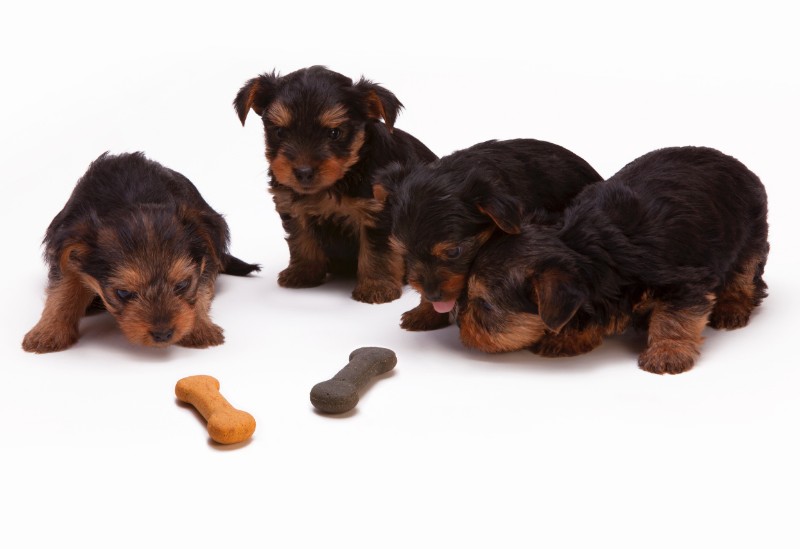Last Updated on October 12, 2018
Most dog owners face problematic behavior at one point or another. However, few realize why their dog was acting destructively in the first place. Some people attribute it to a misbehaved dog, improper socialization, bad relationship or separation anxiety.
But none of them consider what the dog is thinking, and in fact, the implication is that dogs don’t think at all. Their brain is just a bunch of electrical signals symbolizing predetermined responses to external stimuli or something. But anyone who has ever looked closely in a dog’s eyes, especially near feeding time, knows that dogs are intelligent animals.
This misconception most often appears because dogs can’t talk. But just because dogs can’t use language (our language) doesn’t mean they don’t think at all. In fact, not even people think using language all the time. If I tell you to think of your loved ones do you automatically hear words, or do you see pictures, or do you smell something, etc? Most likely there is a combination of pictures, sounds, and feelings associated with the depiction of your loved one.
Dogs think non-verbally, think like a dog
Just like us, dogs use a combination of pictures, sounds, and feelings to create their thoughts. There sounds but not like our own words, more likely they remember sounds of fluttering leaves, the doorbell or us talking.
I bet you’ve wondered what your dog is thinking at times. I’m sure you’ve said “I bet he’s gett,ing hungry by now, he must be thinking when are we serving food”. But the reality is the dog isn’t thinking in terms of questions, but rather in terms of what should happen – usually the owner goes to the kitchen, picks up a bowl, fills it with food and then he puts it in my favorite place – so he’s trying to determine you to begin the sequence which results in you giving him food. If you’re wondering if this is so next time you’re nearing feeding time check out how the dog seems to be pointing from your direction to where you usually fix him meals.
Dogs have limited language learning possibilities; they can only associates certain words with specific actions, such as sit. Luckily, most dogs are fast and learning which sounds are important to them and ignoring the others.
How does separation anxiety crawl up to your plate of problems?
Bob starts experiencing problems when he first arrives later than expected. He reads about how some dog breeds are prone to separation anxiety and believe that’s what what’s happening with his dog too. But let’s take a look at what’s really going on:
Dogs miss us because we are the source of their pleasure. They demand to be petted, we comply, if they want out they start whining and we comply. We always give them what they want, whenever they want. As reunion time approaches the dog is picturing how the door opens and we come in and start to pet them (right now they’re excited because we are supposed to come home) .
But then it goes wrong, the door doesn’t open and nobody is coming. Since they don’t want that, they want us home, they start to become frustrated. As a result, they start looking for the things we often interact with just before we left them alone: such as reading the newspaper, answering the phone, dressing up, selecting shoes, moving albums or sitting on our favorite chair.
So now the dog has found some of the things which symbolize Bob. So he plays with them as best he can (these objects have Bob’s mark all over them so the dog is experiencing his genuine scent). Of course this isn’t sufficient, because Bob is not there. And when Bob does get home he gets excited all over again, and look what happens:
Instead of the usual, joyful greeting Bob notices the mess. Instinctively, albeit wisely, Bob angrily rushes the dog to the demolished newspaper and scolds him. In the dog’s mind things are as conflicting as ever. This results in psychic trauma, the dog becomes ambivalent about Bob coming home, instead of just being happiness he’s also feeling fear. Then Bob thinks “this behavior hasn’t stopped, the punishment mustn’t have been severe enough” and you can easily see how distraught the relationship soon becomes. From this point on you can imagine how much chance Bob has to remedy his relationship with his dog.
How to fix destructive behavior now that you know why it happens?
Before we go any further we must note that there are many physical and medical causes for anxiety (thyrotoxicosis, encephalitis, allergies and so on) so be sure to check with the veterinary to rule out such causes.
When dogs are upset about being left alone it happens because they get everything they want. In this sense, the dog is leading the owner. Look to see if the dog moves ahead of you when you go into a new room or how often you please him whenever he whines. You need to change this around!
Present a different reality to the dog. When he starts whining pleasantly tell him to obey a simple command. If he does praise him for three seconds, otherwise ignore him. Bossy dogs don’t like things being turned around on them so they won’t immediately comply.
It may take up to four days of ignoring the dog completely before he turns around. Hang in there, it’s going to happen. Also ignore the dog whenever you come home until he completely settles down, then greet him at a place away from the front door (so as not to associate greeting with the front door).
The toughest part is ignoring the dogs mess when you come home: pillows have been pulverized, a pile of poop sits gracefully in the middle of the room, the chair is messed up again, the wall has been scratched again and the dog has been at your shoes with quite the fervor. It is crucial to not give any attention (negative or otherwise) to the dog. Instead greet him in a different room and lock him there while you Secretly clean up the mess. Let the magic do it’s work. And finally Bob and his dog are happy.
Read more about, Stop my dog from Barking


